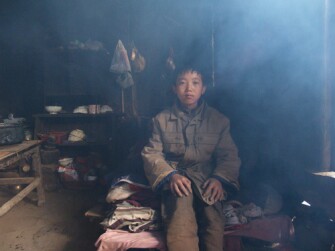
As we ring in 2014, one of my many resolutions is to use the few resources I have to bring greater connections to what I care about. This week, second-year English teacher, Fran Deram, wants to share the experiences of one of her students and make a request for how we can help her students understand that although life is tough, the world is full of compassionate people rooting for them to succeed.
Meet 续德寿 (Tony). Right now, he is an 8th grade student at Big Dynasty Mountain Middle School in one of the poorest areas in Yunnan, China. I greatly admire Tony - in contrast with his frail and weak body, he has a steadfast spirit. Despite his mother’s suicide, his father’s severe alcoholism, his poor household, his lacking Mandarin, and the black coal stove next to the bed he shares with his grandma, Tony works hard every single day for a better future - his better future.
Tucked away deep in the terraced mountains that line the Lancang [Mekong] River, close to the border of Myanmar, the Big Dynasty Mountain West Town is far away from just about everything. Its location, which is three hours away from the nearest developed city, means that the closest bookstore, the nearest eyeglass store, established clothing stores, large-scale restaurants, knick-knack shops, and grocery stores are all also three hours away. Comparatively, one might say the people in the town are well-off. Tony lives yet another three hour walk up and down a mountain outside of Big Dynasty Mountain West Town, a trek that he makes by himself twice every weekend to leave and arrive at the middle school.
In his first semester of semester of 7th grade, Tony had a fiercely quiet disposition. He would copy notes, sometimes incorrectly (I later found that his eyesight was not very good), but never answer or ask questions in class. When I called on him, his responses were stuttered and mumbled and would not meet my eyes. His grades in all subjects were in the bottom rung of the class. Still, he tried hard and never acted out in class. His diligence paid off slowly. First, I noticed a gradual change in his Mandarin, which was helped by some students correcting him in class. As weeks went by, I noticed that he raised his hand at least once in every class to answer a question. When I set up an English Club and invited students to submit an application, he was the first in his class to do so. I accepted the application from his hands and heard his strong and resolute voice, saying: “Teacher, this is my application.” I looked forward to reading it. Near the end of the first semester, Tony had become an active participant and replied to questions with determination.
Last fall, I was able to make the hike with his homeroom teacher, Miss Cai, another Teach For China teacher, to his village. The purpose of the visit was to better understand Tony’s life at home, the situation of his parents, and to encourage both parties to keep Tony studying past graduation--a result of which over 30% of Big Dynasty Mountain’s students will likely not achieve. Having been to some other students’ homes before Tony’s, I knew to expect his family to speak only the local dialect and to have rustic housing conditions. But when Tony started to re-count his family’s story, Miss Cai and I were shocked into silence.
When Tony was six, his mother committed suicide and left the house and its up-keep to her husband, as well as her mother and father. Later, they helped Tony’s mute uncle also move into the family so he could be taken care of. Faced by the daunting pressure of the household, Tony’s father started drinking heavily and spent the family’s money on alcohol. Eventually, his father had gradually sold of the family’s ten cows for booze and eventually lost his job as a mechanic. There were more stories to tell, but I stopped him and asked curiously what kept him studying and what his dream was. He looked me square in the eyes and replied: “I want to leave Yunnan and go to college.”
Tony is special not because he views his education and learning as a “way out” of his dismal situation, but because he knows that the short practice worksheets and answering questions in class are how one takes small steps to reach his goal. He really impressed not just his teachers but also his classmates last spring when he went from being second-to-last in the grade ranking to number four on his English exam. He routinely seeks out Miss Cai and myself to drill off the most important grammar and vocabulary points for each unit. If he has a question, I always know that he will never be afraid to ask it. But I worry about the exhausting road ahead of him, which not includes extremely difficult entrance exams into high school and, later on, college, but also the finances and resources to continue onward. Right now, I can only teach Tony of a compassionate world. I sincerely hope you can show him that it is real.
Tony is one out of 50 classmates that make up Class 61 (61班), only few of whom are in a better situation than Tony. For the start of the New Year, please consider sending a postcard, email, school supplies, clothes, a cool toy, or whatever you think that might symbolize our theme of “Run Faster, Jump Higher, Work Harder, Be Smarter” to Tony and/or his classmates.
Thank you,
Miss Du (Frances Deram)
Teach for China Fellow ‘12-'14
*Address (must include both English and Chinese):
Frances Deram (杜菲兰)
Dachaoshan Middle School Office
Dachaoshan, Yunxian, Lincang shi,
Yunnan, China 中国
Phone: 18008833120
Email: franderam(at)gmail.com
云南省临沧市云县大朝山西镇中学
杜菲兰 电话号:18008833120
Photo by Frances Deram